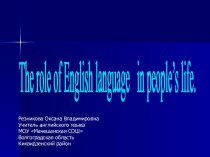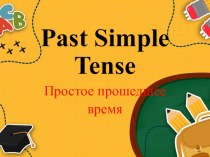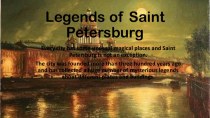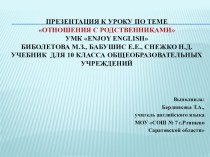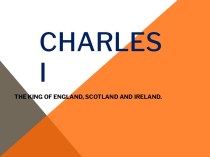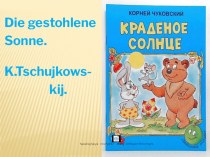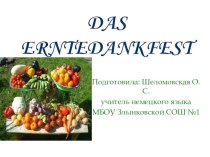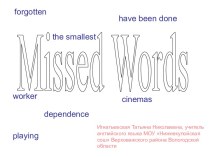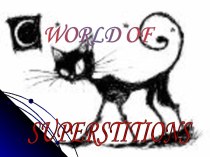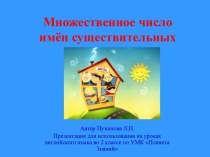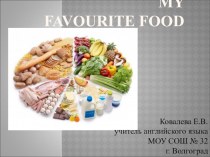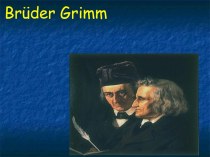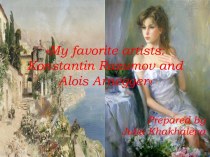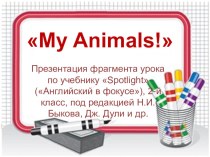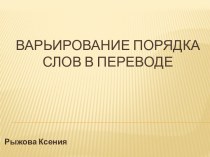- Главная
- Разное
- Бизнес и предпринимательство
- Образование
- Развлечения
- Государство
- Спорт
- Графика
- Культурология
- Еда и кулинария
- Лингвистика
- Религиоведение
- Черчение
- Физкультура
- ИЗО
- Психология
- Социология
- Английский язык
- Астрономия
- Алгебра
- Биология
- География
- Геометрия
- Детские презентации
- Информатика
- История
- Литература
- Маркетинг
- Математика
- Медицина
- Менеджмент
- Музыка
- МХК
- Немецкий язык
- ОБЖ
- Обществознание
- Окружающий мир
- Педагогика
- Русский язык
- Технология
- Физика
- Философия
- Химия
- Шаблоны, картинки для презентаций
- Экология
- Экономика
- Юриспруденция
Что такое findslide.org?
FindSlide.org - это сайт презентаций, докладов, шаблонов в формате PowerPoint.
Обратная связь
Email: Нажмите что бы посмотреть
Презентация на тему по английскому языку на тему Праздники Татарстана
Содержание
- 2. multinational republic- Tatarstan is one of the
- 3. symbols of TatarstanEach state has an independent
- 4. The State Emblem of the Republic of
- 5. State flag- The national flag - a
- 6. National traditions and art of the Tatar
- 7. religious holidaysCorban Bairam - MuslimsChristmas - the
- 8. Feast of the Sacrifice - the
- 9. religion
- 10. Our holidaysIn the life of every people
- 11. Sabantuy - folk festival. The origins of
- 12. Tatar traditions
- 13. Perhaps the most massive and popular festival
- 14. Традиционные соревнования сабантуя: - Fight with sacks of
- 15. Very bright, flashing, an international festival - Sabantuy.
- 16. Wedding ceremonies TatarsEvery conspiracy preceded the
- 17. nikahwedding
- 18. In the Tatar national costume prevail white,
- 19. headgearHeaddress men was chetyrёhklinnaya hemispherical shape skullcap
- 20. Tatars
- 21. National clothes for women
- 22. Clothing for men
- 23. Kitchen, table etiquette traditionInteresting and varied
- 24. Numerous travelers who visited Kazan, called national
- 25. national dishesOf the variety of dishes are
- 26. Music Tatar peopleMusic of the Tatar people,
- 27. Tatar dances
- 28. The most common tools of the
- 29. :Tatars play on
- 30. Fulfilled:Galimullin Alice Aydarovna. instructor: Adgamova Alina Ildusovna.Thank you for your attention.
- 31. Скачать презентацию
- 32. Похожие презентации
multinational republic- Tatarstan is one of the most ethnically diverse areas in Russia - representatives of more than 115 nationalities live in the country. Among the peoples of Tatarstan, the prevailing terms of population - the
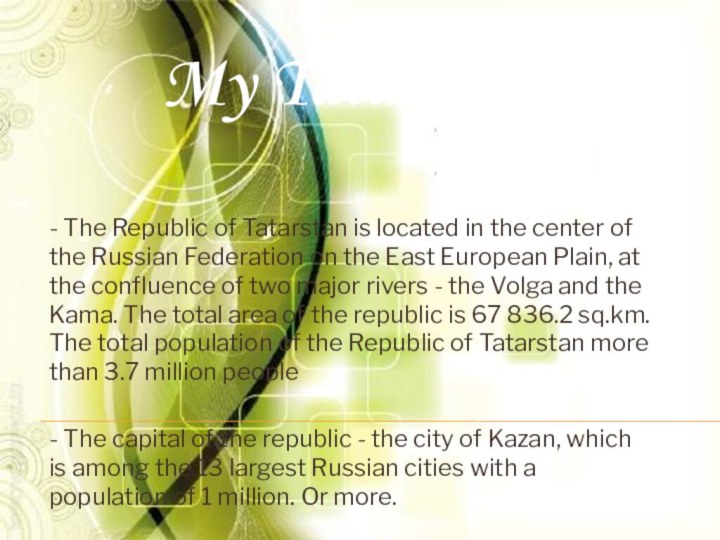
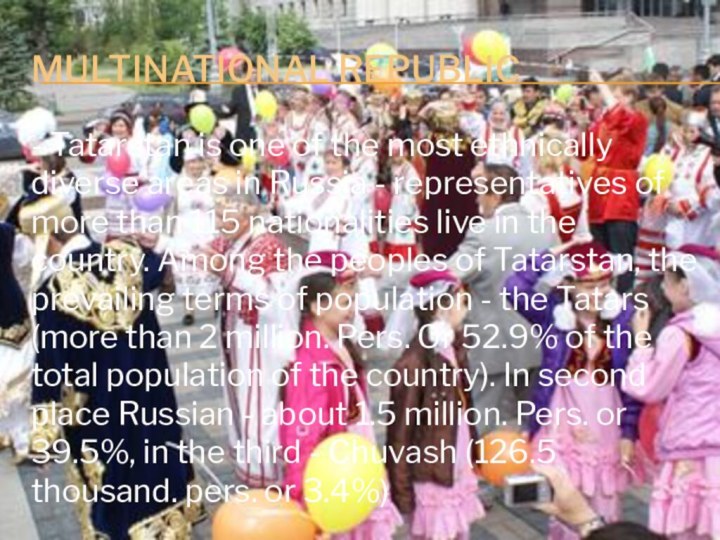
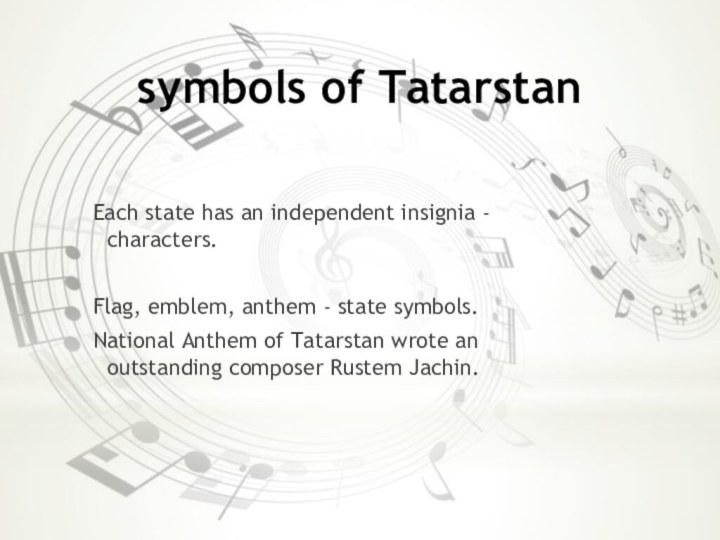
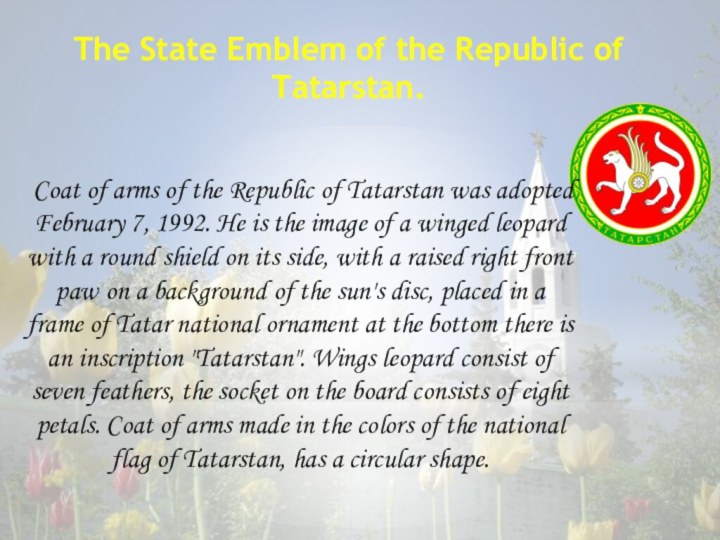
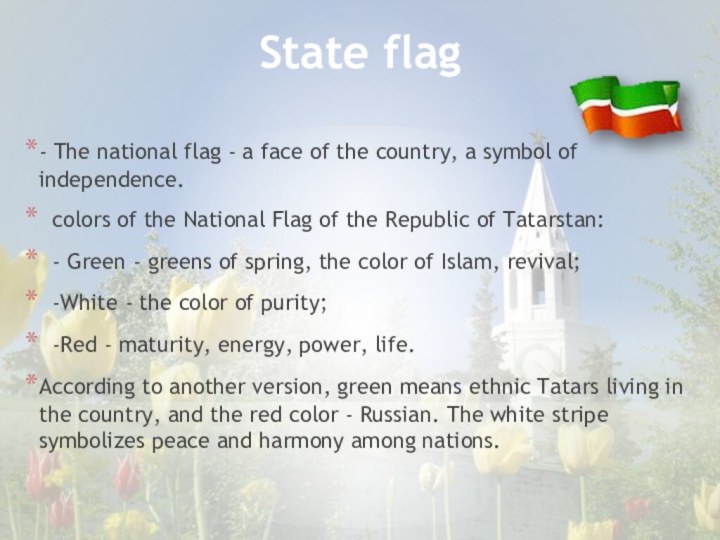
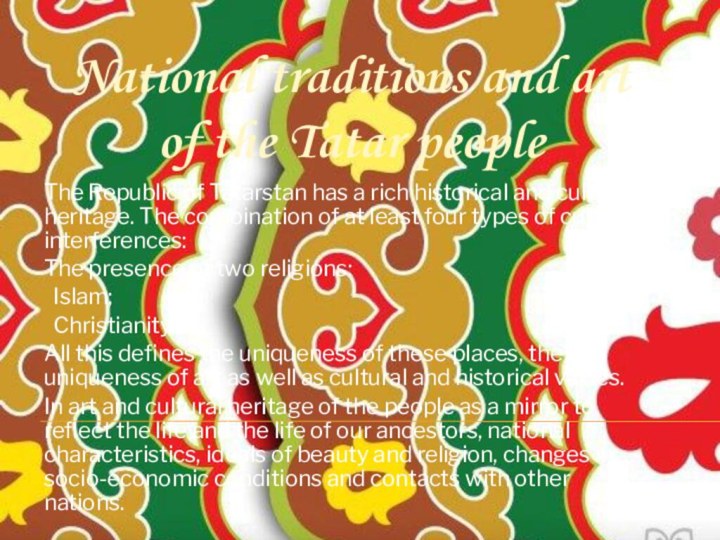
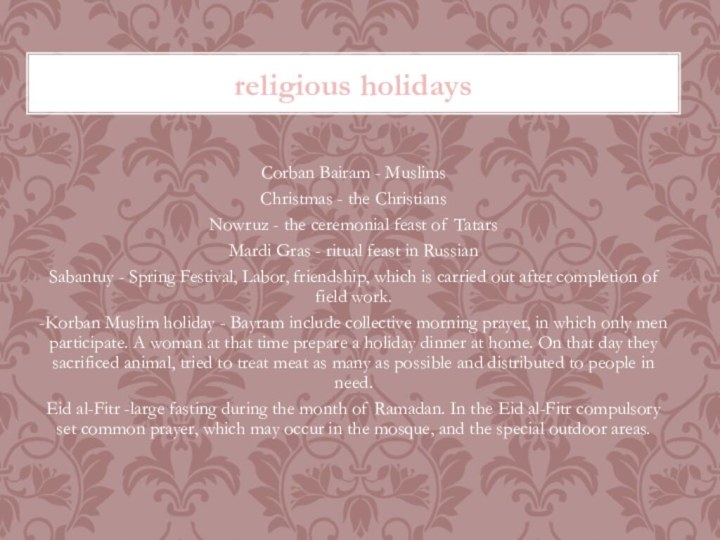
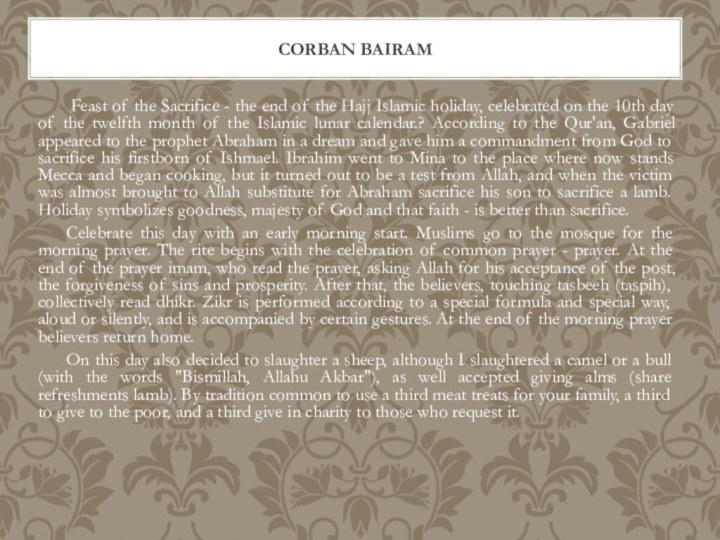
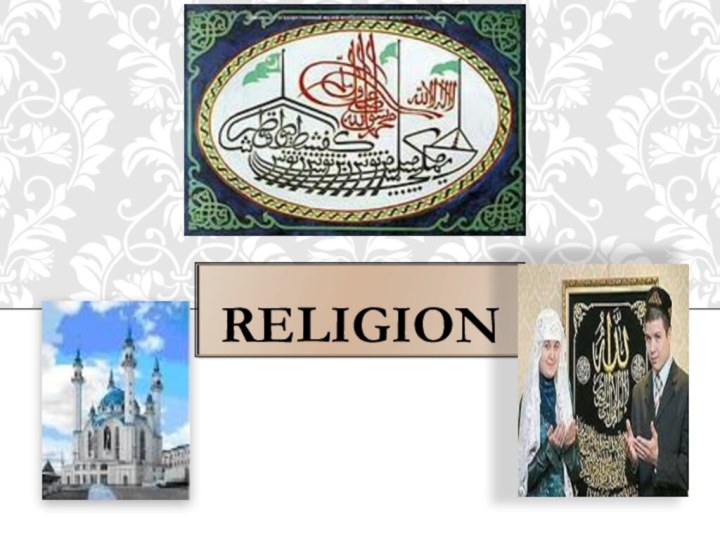
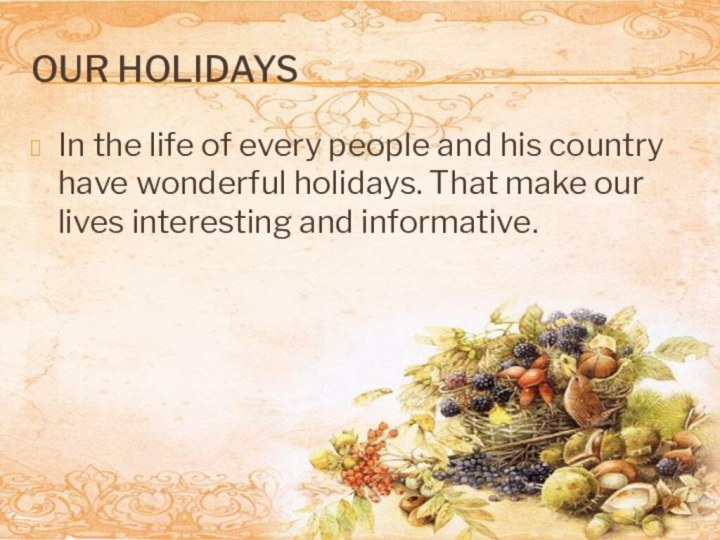
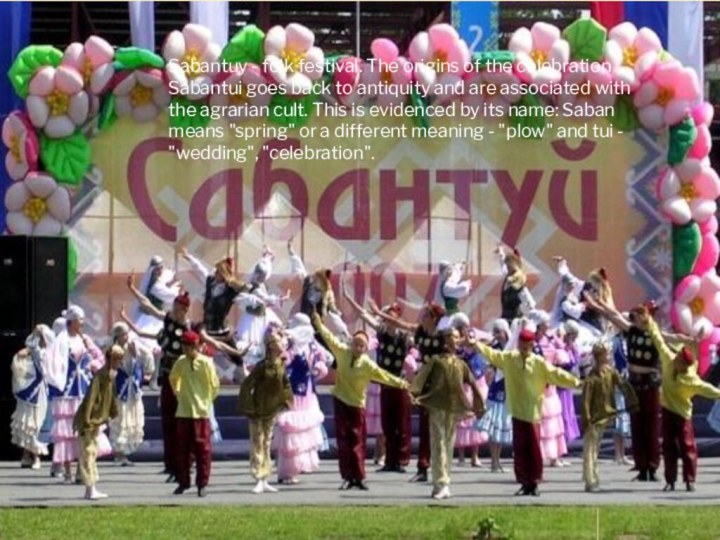
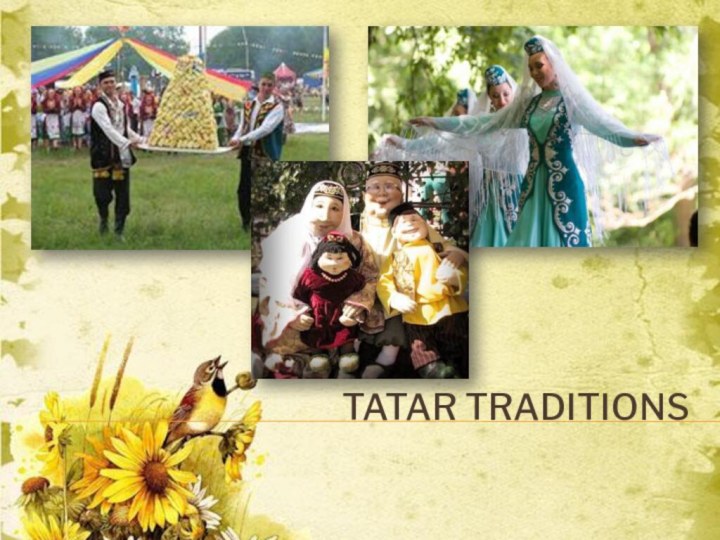
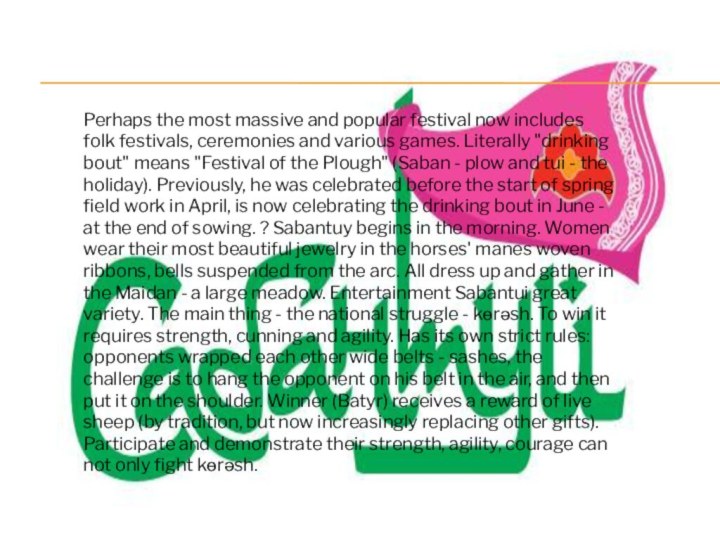
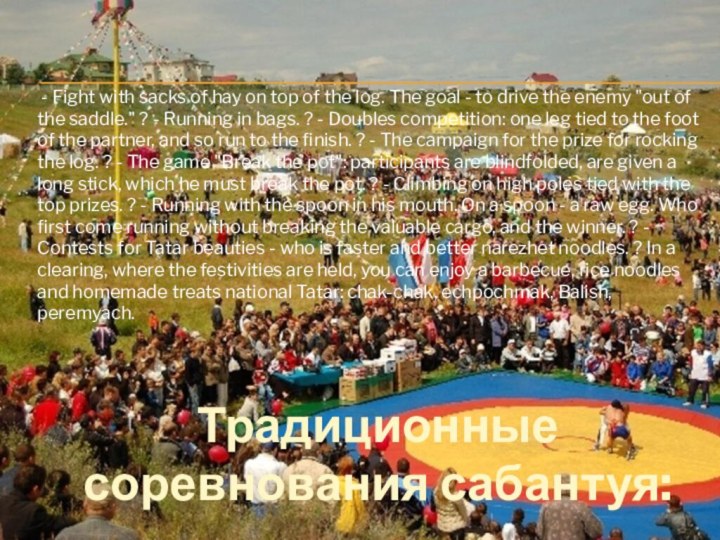
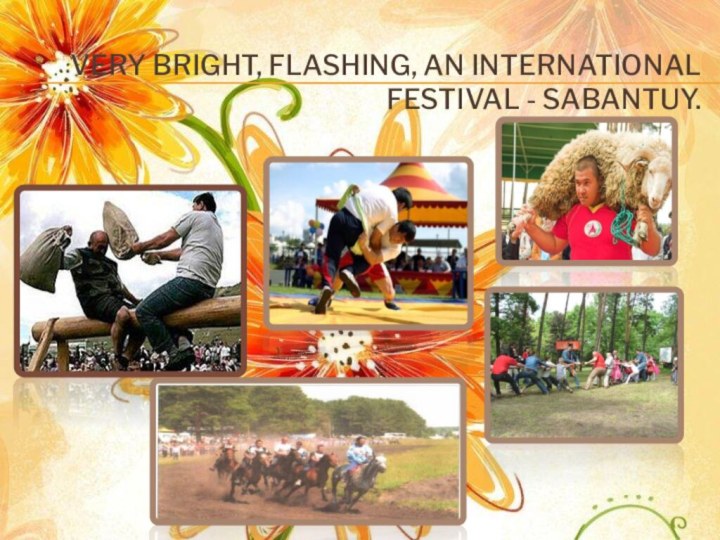
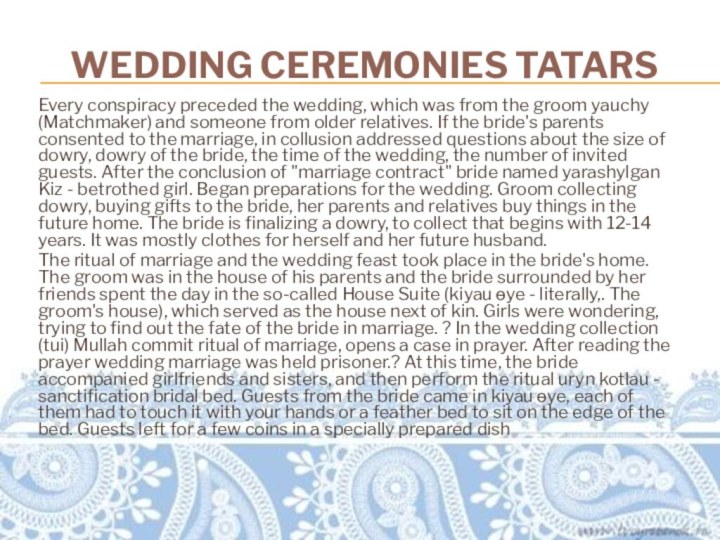
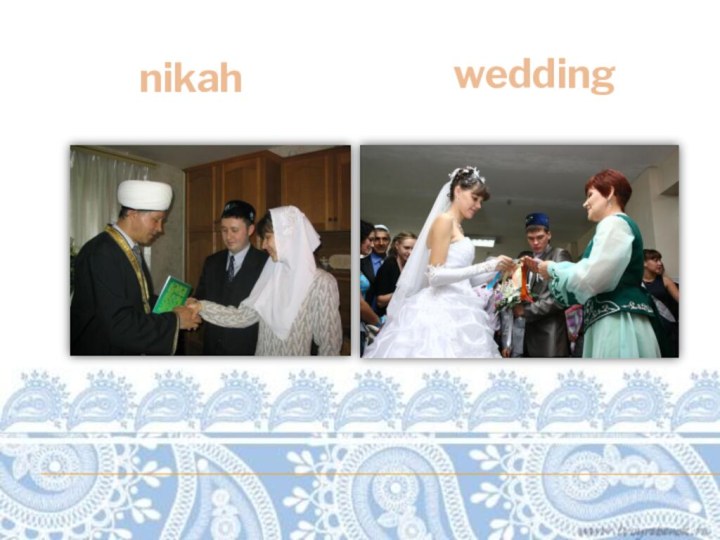
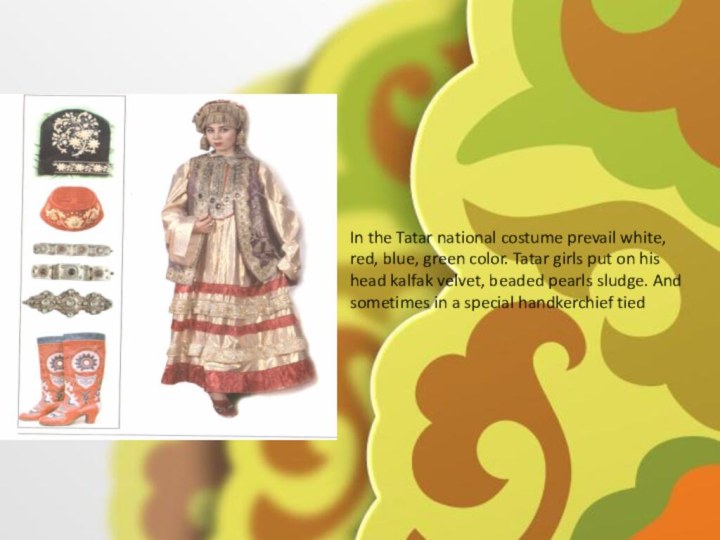
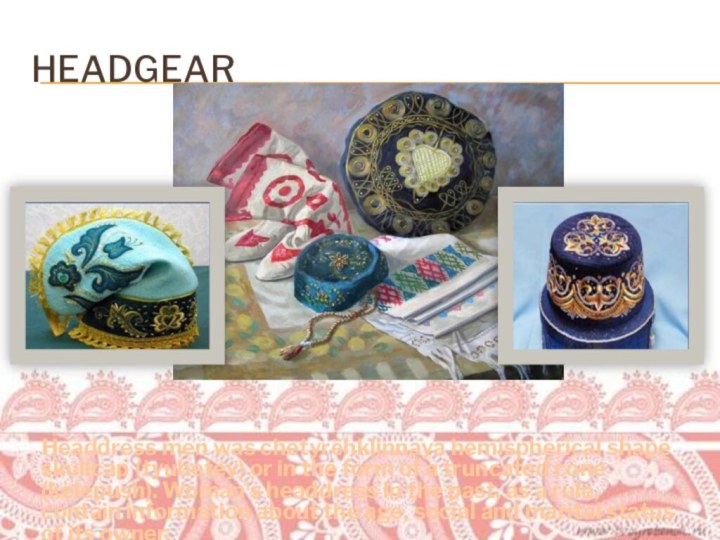
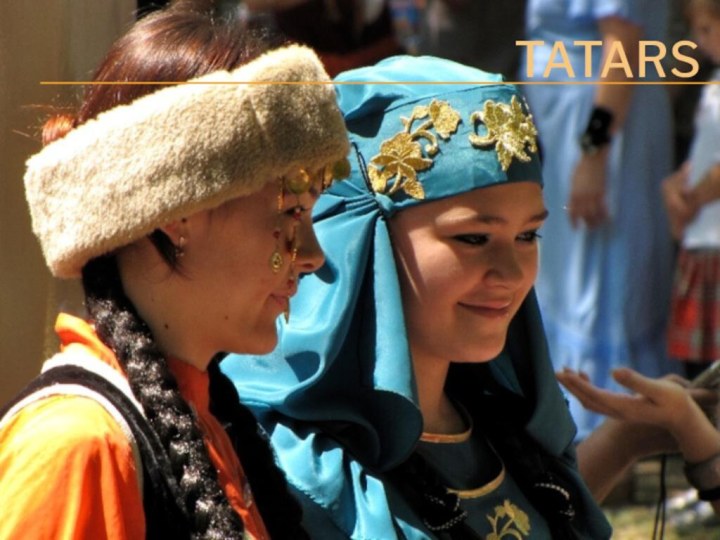
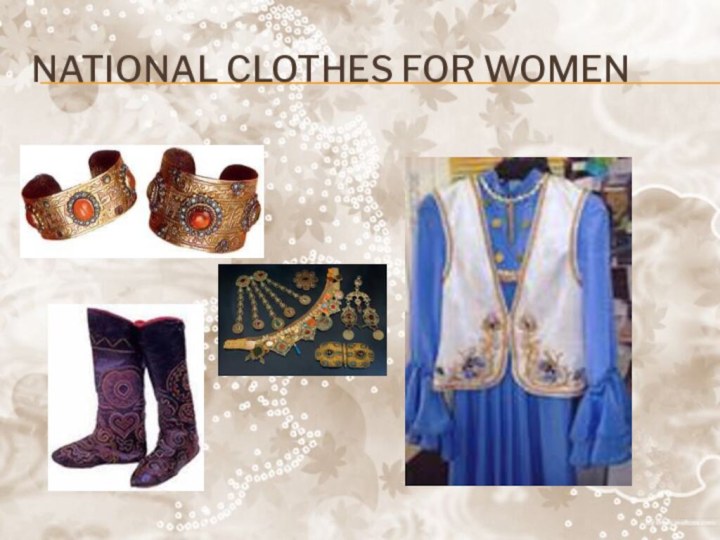
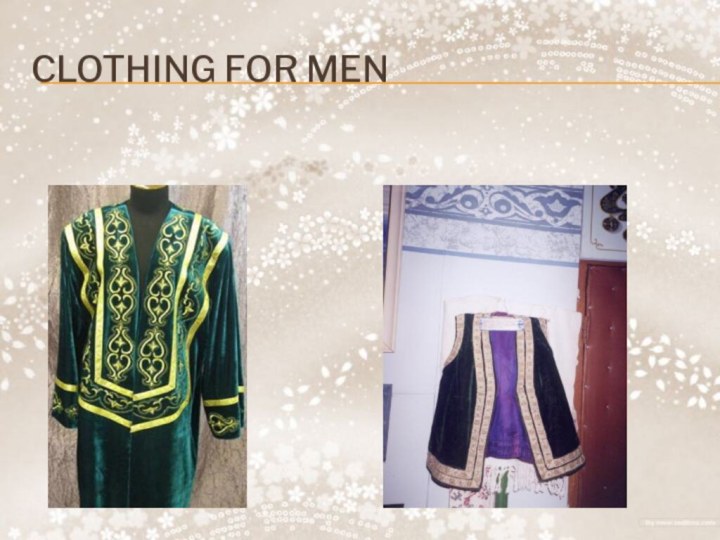
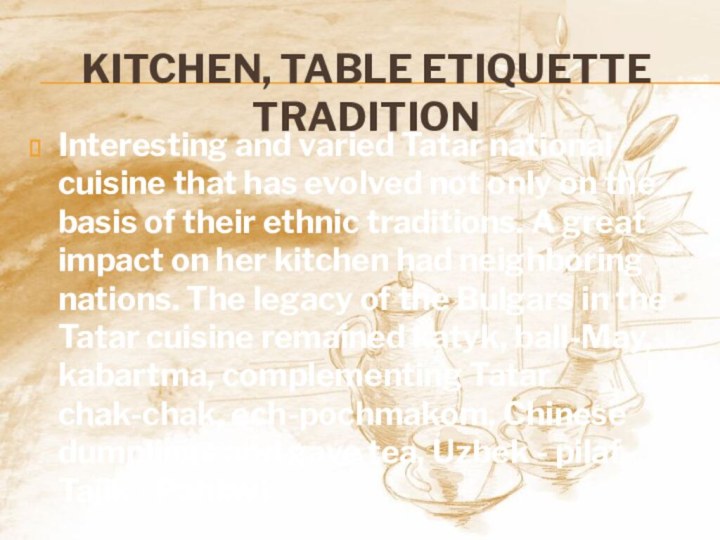
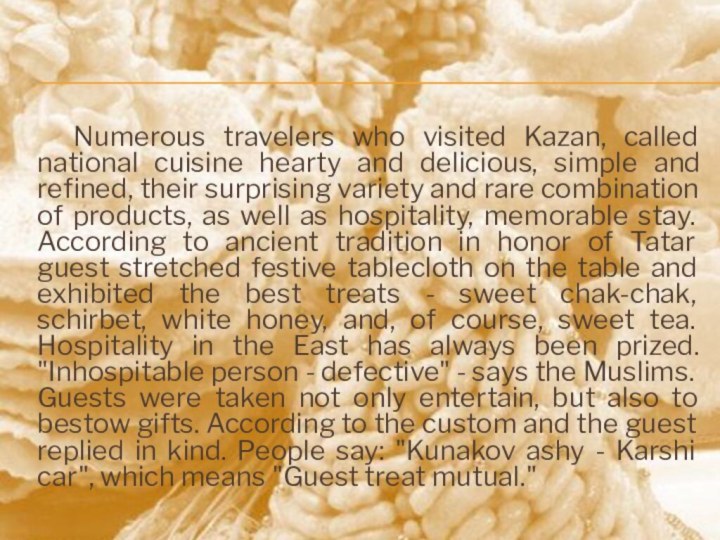
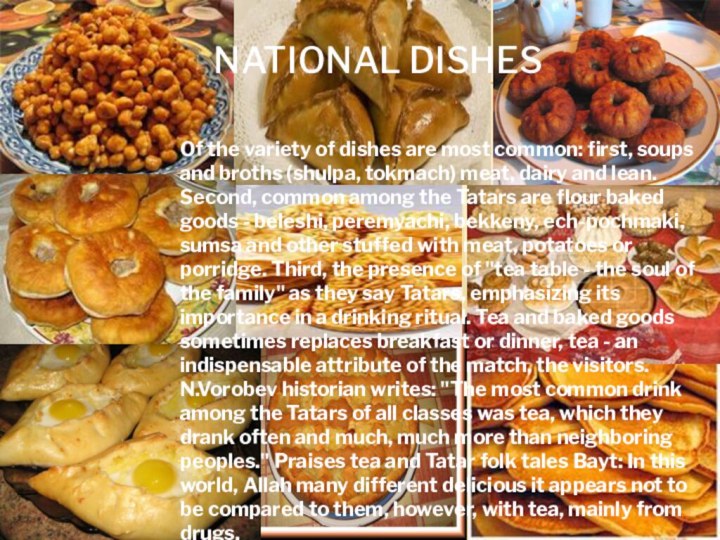
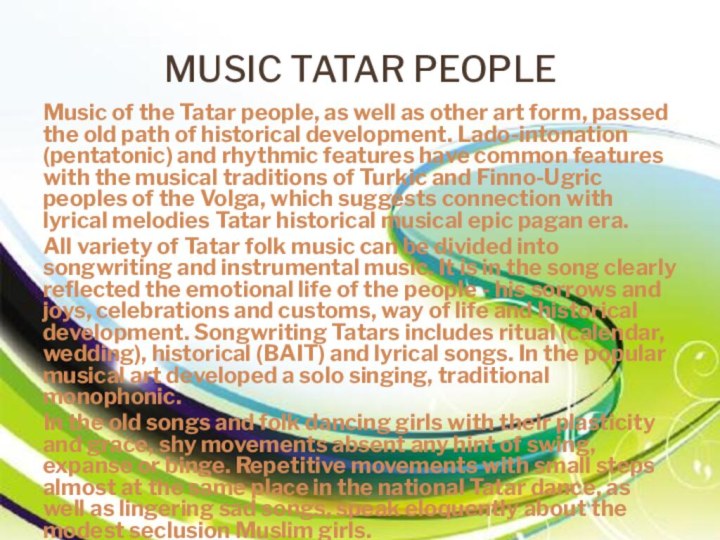
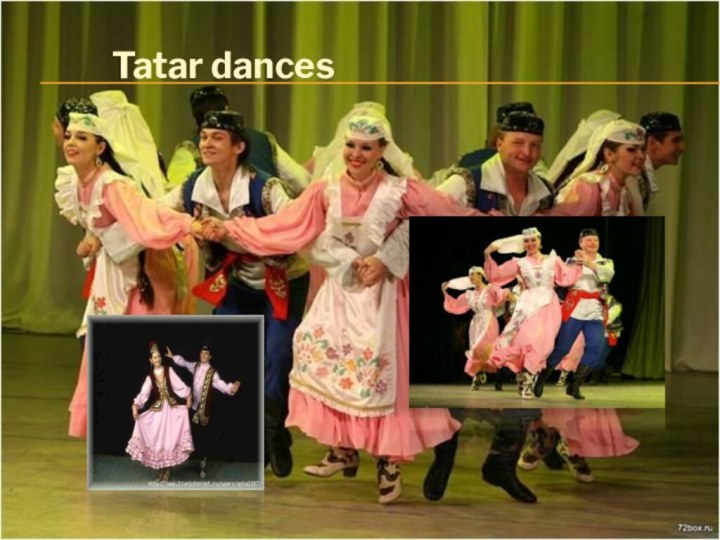
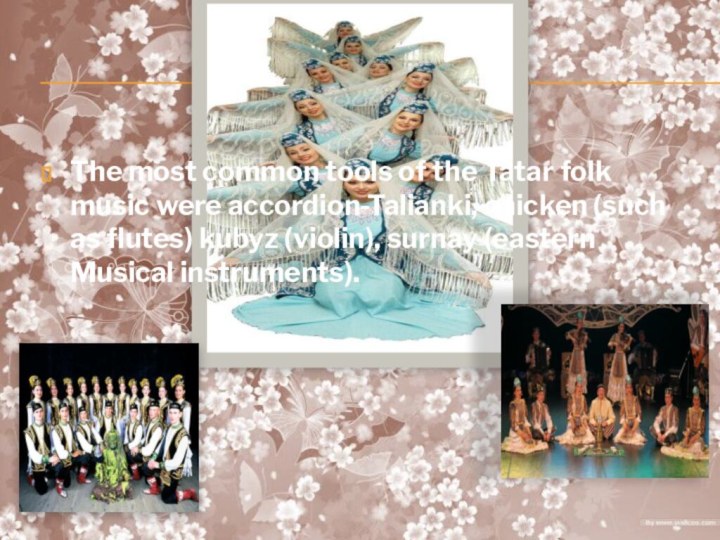
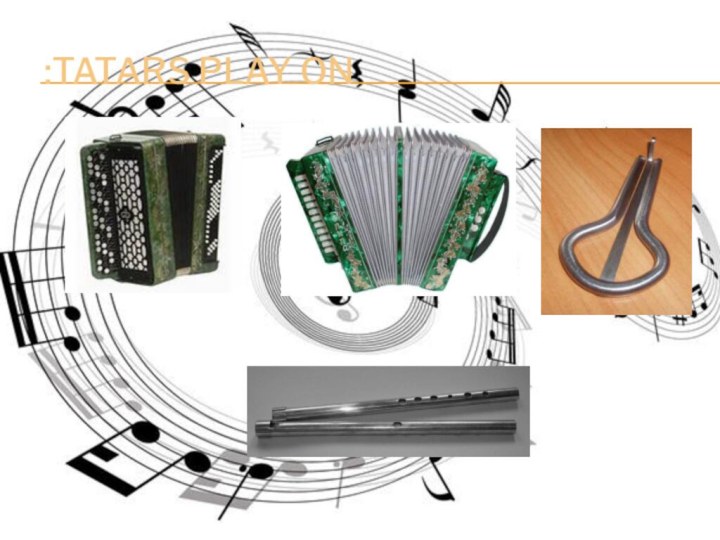

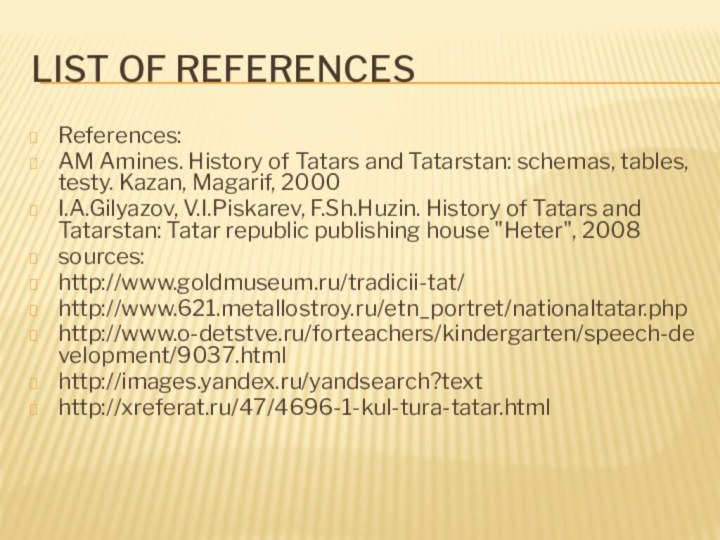
Слайд 3
symbols of Tatarstan
Each state has an independent insignia
- characters.
Flag, emblem, anthem - state symbols.
National Anthem of
Tatarstan wrote an outstanding composer Rustem Jachin.
Слайд 4
The State Emblem of the Republic of Tatarstan.
Coat of arms of the Republic of Tatarstan was
adopted February 7, 1992. He is the image of a winged leopard with a round shield on its side, with a raised right front paw on a background of the sun's disc, placed in a frame of Tatar national ornament at the bottom there is an inscription "Tatarstan". Wings leopard consist of seven feathers, the socket on the board consists of eight petals. Coat of arms made in the colors of the national flag of Tatarstan, has a circular shape.
Слайд 5
State flag
- The national flag - a face
of the country, a symbol of independence.
colors of
the National Flag of the Republic of Tatarstan:- Green - greens of spring, the color of Islam, revival;
-White - the color of purity;
-Red - maturity, energy, power, life.
According to another version, green means ethnic Tatars living in the country, and the red color - Russian. The white stripe symbolizes peace and harmony among nations.
Слайд 6
National traditions and art of the Tatar people
The
Republic of Tatarstan has a rich historical and cultural
heritage. The combination of at least four types of cultural interferences:The presence of two religions:
Islam;
Christianity;
All this defines the uniqueness of these places, the uniqueness of art as well as cultural and historical values.
In art and cultural heritage of the people as a mirror to reflect the life and the life of our ancestors, national characteristics, ideals of beauty and religion, changes in socio-economic conditions and contacts with other nations.
Слайд 7
religious holidays
Corban Bairam - Muslims
Christmas - the Christians
Nowruz
- the ceremonial feast of Tatars
Mardi Gras - ritual
feast in RussianSabantuy - Spring Festival, Labor, friendship, which is carried out after completion of field work.
-Korban Muslim holiday - Bayram include collective morning prayer, in which only men participate. A woman at that time prepare a holiday dinner at home. On that day they sacrificed animal, tried to treat meat as many as possible and distributed to people in need.
Eid al-Fitr -large fasting during the month of Ramadan. In the Eid al-Fitr compulsory set common prayer, which may occur in the mosque, and the special outdoor areas.
Слайд 8 Feast of the Sacrifice - the end
of the Hajj Islamic holiday, celebrated on the 10th
day of the twelfth month of the Islamic lunar calendar.? According to the Qur'an, Gabriel appeared to the prophet Abraham in a dream and gave him a commandment from God to sacrifice his firstborn of Ishmael. Ibrahim went to Mina to the place where now stands Mecca and began cooking, but it turned out to be a test from Allah, and when the victim was almost brought to Allah substitute for Abraham sacrifice his son to sacrifice a lamb. Holiday symbolizes goodness, majesty of God and that faith - is better than sacrifice.Celebrate this day with an early morning start. Muslims go to the mosque for the morning prayer. The rite begins with the celebration of common prayer - prayer. At the end of the prayer imam, who read the prayer, asking Allah for his acceptance of the post, the forgiveness of sins and prosperity. After that, the believers, touching tasbeeh (taspih), collectively read dhikr. Zikr is performed according to a special formula and special way, aloud or silently, and is accompanied by certain gestures. At the end of the morning prayer believers return home.
On this day also decided to slaughter a sheep, although I slaughtered a camel or a bull (with the words "Bismillah, Allahu Akbar"), as well accepted giving alms (share refreshments lamb). By tradition common to use a third meat treats for your family, a third to give to the poor, and a third give in charity to those who request it.
Corban Bairam
Слайд 10
Our holidays
In the life of every people and
his country have wonderful holidays. That make our lives
interesting and informative.Слайд 11 Sabantuy - folk festival. The origins of the
celebration Sabantui goes back to antiquity and are associated
with the agrarian cult. This is evidenced by its name: Saban means "spring" or a different meaning - "plow" and tui - "wedding", "celebration".Слайд 13 Perhaps the most massive and popular festival now
includes folk festivals, ceremonies and various games. Literally "drinking
bout" means "Festival of the Plough" (Saban - plow and tui - the holiday). Previously, he was celebrated before the start of spring field work in April, is now celebrating the drinking bout in June - at the end of sowing. ? Sabantuy begins in the morning. Women wear their most beautiful jewelry in the horses' manes woven ribbons, bells suspended from the arc. All dress up and gather in the Maidan - a large meadow. Entertainment Sabantui great variety. The main thing - the national struggle - kөrәsh. To win it requires strength, cunning and agility. Has its own strict rules: opponents wrapped each other wide belts - sashes, the challenge is to hang the opponent on his belt in the air, and then put it on the shoulder. Winner (Batyr) receives a reward of live sheep (by tradition, but now increasingly replacing other gifts). Participate and demonstrate their strength, agility, courage can not only fight kөrәsh.
Слайд 14
Традиционные соревнования сабантуя:
- Fight with sacks of hay
on top of the log. The goal - to
drive the enemy "out of the saddle." ? - Running in bags. ? - Doubles competition: one leg tied to the foot of the partner, and so run to the finish. ? - The campaign for the prize for rocking the log. ? - The game "Break the pot": participants are blindfolded, are given a long stick, which he must break the pot. ? - Climbing on high poles tied with the top prizes. ? - Running with the spoon in his mouth. On a spoon - a raw egg. Who first come running without breaking the valuable cargo, and the winner. ? - Contests for Tatar beauties - who is faster and better narezhet noodles. ? In a clearing, where the festivities are held, you can enjoy a barbecue, rice noodles and homemade treats national Tatar: chak-chak, echpochmak, Balish, peremyach.
Слайд 16
Wedding ceremonies Tatars
Every conspiracy preceded the wedding,
which was from the groom yauchy (Matchmaker) and someone
from older relatives. If the bride's parents consented to the marriage, in collusion addressed questions about the size of dowry, dowry of the bride, the time of the wedding, the number of invited guests. After the conclusion of "marriage contract" bride named yarashylgan Kiz - betrothed girl. Began preparations for the wedding. Groom collecting dowry, buying gifts to the bride, her parents and relatives buy things in the future home. The bride is finalizing a dowry, to collect that begins with 12-14 years. It was mostly clothes for herself and her future husband.The ritual of marriage and the wedding feast took place in the bride's home. The groom was in the house of his parents and the bride surrounded by her friends spent the day in the so-called House Suite (kiyau өye - literally,. The groom's house), which served as the house next of kin. Girls were wondering, trying to find out the fate of the bride in marriage. ? In the wedding collection (tui) Mullah commit ritual of marriage, opens a case in prayer. After reading the prayer wedding marriage was held prisoner.? At this time, the bride accompanied girlfriends and sisters, and then perform the ritual uryn kotlau - sanctification bridal bed. Guests from the bride came in kiyau өye, each of them had to touch it with your hands or a feather bed to sit on the edge of the bed. Guests left for a few coins in a specially prepared dish
Слайд 18 In the Tatar national costume prevail white, red,
blue, green color. Tatar girls put on his head
kalfak velvet, beaded pearls sludge. And sometimes in a special handkerchief tied
Слайд 19
headgear
Headdress men was chetyrёhklinnaya hemispherical shape skullcap (tyubetey)
or in the form of a truncated cone (kelepush).
Woman's headdress in the past, as a rule, contain information about the age, social and marital status of its owner.
Слайд 23
Kitchen, table etiquette tradition
Interesting and varied Tatar national
cuisine that has evolved not only on the basis
of their ethnic traditions. A great impact on her kitchen had neighboring nations. The legacy of the Bulgars in the Tatar cuisine remained katyk, ball-May, kabartma, complementing Tatar chak-chak, ech-pochmakom, Chinese dumplings and gave tea, Uzbek - pilaf, Tajik - PahlaviСлайд 24 Numerous travelers who visited Kazan, called national cuisine
hearty and delicious, simple and refined, their surprising variety
and rare combination of products, as well as hospitality, memorable stay. According to ancient tradition in honor of Tatar guest stretched festive tablecloth on the table and exhibited the best treats - sweet chak-chak, schirbet, white honey, and, of course, sweet tea. Hospitality in the East has always been prized. "Inhospitable person - defective" - says the Muslims. Guests were taken not only entertain, but also to bestow gifts. According to the custom and the guest replied in kind. People say: "Kunakov ashy - Karshi car", which means "Guest treat mutual."
Слайд 25
national dishes
Of the variety of dishes are most
common: first, soups and broths (shulpa, tokmach) meat, dairy
and lean. Second, common among the Tatars are flour baked goods - beleshi, peremyachi, bekkeny, ech-pochmaki, sumsa and other stuffed with meat, potatoes or porridge. Third, the presence of "tea table - the soul of the family" as they say Tatars, emphasizing its importance in a drinking ritual. Tea and baked goods sometimes replaces breakfast or dinner, tea - an indispensable attribute of the match, the visitors. N.Vorobev historian writes: "The most common drink among the Tatars of all classes was tea, which they drank often and much, much more than neighboring peoples." Praises tea and Tatar folk tales Bayt: In this world, Allah many different delicious it appears not to be compared to them, however, with tea, mainly from drugs.
Слайд 26
Music Tatar people
Music of the Tatar people, as
well as other art form, passed the old path
of historical development. Lado-intonation (pentatonic) and rhythmic features have common features with the musical traditions of Turkic and Finno-Ugric peoples of the Volga, which suggests connection with lyrical melodies Tatar historical musical epic pagan era.All variety of Tatar folk music can be divided into songwriting and instrumental music. It is in the song clearly reflected the emotional life of the people - his sorrows and joys, celebrations and customs, way of life and historical development. Songwriting Tatars includes ritual (calendar, wedding), historical (BAIT) and lyrical songs. In the popular musical art developed a solo singing, traditional monophonic.
In the old songs and folk dancing girls with their plasticity and grace, shy movements absent any hint of swing, expanse or binge. Repetitive movements with small steps almost at the same place in the national Tatar dance, as well as lingering sad songs, speak eloquently about the modest seclusion Muslim girls.
